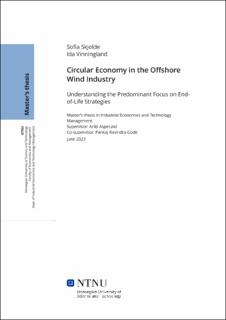| dc.contributor.advisor | Aspelund, Arild | |
| dc.contributor.advisor | Ravindra Gode, Pankaj | |
| dc.contributor.author | Skjolde, Sofia | |
| dc.contributor.author | Vinningland, Ida | |
| dc.date.accessioned | 2023-11-15T18:19:51Z | |
| dc.date.available | 2023-11-15T18:19:51Z | |
| dc.date.issued | 2023 | |
| dc.identifier | no.ntnu:inspera:146715827:152961982 | |
| dc.identifier.uri | https://hdl.handle.net/11250/3102812 | |
| dc.description.abstract | Den raske veksten i havvind-industrien og mangelen på gode skalerbare resirkuleringssystemer bidrar til en betydelig fremtidig global krise når det kommer til avfallshåndtering og utvinning av råvarer. Å innføre en sirkulær økonomi pekes på som en løsning på dette problemet, og teoretisk forskning hevder at industrier bør ha et helhetlig livssyklusperspektiv når de implementerer en sirkulær økonomi. Likevel fokuserer havvind-industrien hovedsakelig på å iverksette prinsippene for sirkulær økonomi når vindparker når slutten av levetiden. Derfor ser denne studien nærmere på hvorfor dette er industriens hovedfokus når teoretisk forskning har vist at det er fordeler ved adopsjon av sirkulære prinsipper i tidlig fase. En kvalitativ forskningsmetode er benyttet, og det er gjennomført semi-strukturerte intervjuer med tre utstyrsleverandører, tre utviklere, fire firmaer som håndterer turbiner på slutten av forventet levetid, og tre fasilitatorer med omfattende bransjekunnskap. Denne studien viser at aktørene i havvind-industrien i hovedsak fokuserer på å innføre en sirkulær økonomi ved slutten av levetid på grunn av press fra eksterne interessenter og lovgivning som tvinger frem nye løsninger for håndtering av brukte turbiner. I tillegg viser funnene at industrien er sterkt kostnadsdrevet, og for å øke graden av sirkulær økonomi må myndigheter derfor inkludere sirkulær økonomi, også i begynnelsen av levetid, som et konkurranseelement i anbudsprosesser for nye vindparker. Denne studien gir også verdifulle teoretiske bidrag til litteraturen om havvind og sirkulær økonomi ved å forklare hvorfor aktørene i industrien hovedsakelig fokuserer sine sirkulære satsninger på hvordan å håndtere brukte turbiner. I tillegg gir denne studien implikasjoner for myndigheter og ledere om hvordan man kan øke sirkulariteten i den offshore vindindustrien. | |
| dc.description.abstract | The offshore wind industry's rapid growth and inadequate recycling systems contribute to the global crisis of waste accumulation and unsustainable raw material extraction. Adopting a circular economy is stressed as a solution to this issue and theoretical research advocates that industries should adopt a full life cycle perceptive when implementing a circular economy. However, the offshore wind industry predominantly focuses on adopting circular economy principles when wind farms reach end-of-life. Therefore, this study investigates why this is the industry's main focus when theoretical research has proven the benefits of early-stage circular economy adoption. A qualitative research approach is adopted, conducting semi-structured interviews with three manufacturing firms, three developer firms, four end-of-life handling firms, and three facilitators with comprehensive industry knowledge. This study shows that the offshore wind industry actors primarily focus on circular economy adoption at end-of-life because external stakeholder pressure and legislation are pushing actors to develop new solutions on issues related to decommissioning. Additionally, the findings emphasize that the industry is highly cost-driven, and to increase the level of circularity, policymakers have to include circular economy, also for beginning-of-life, as a competitive element in tender criteria. This study provides valuable theoretical contributions to the literature on offshore wind and circular economy by explaining why industry actors primarily focus their circular efforts on the end-of-life phase. In addition, this study provides implications for policymakers and managers on how to increase circularity in the offshore wind industry. | |
| dc.language | eng | |
| dc.publisher | NTNU | |
| dc.title | Circular Economy in the Offshore Wind Industry: Understanding the Predominant Focus on End-of-Life Strategies | |
| dc.type | Master thesis | |
